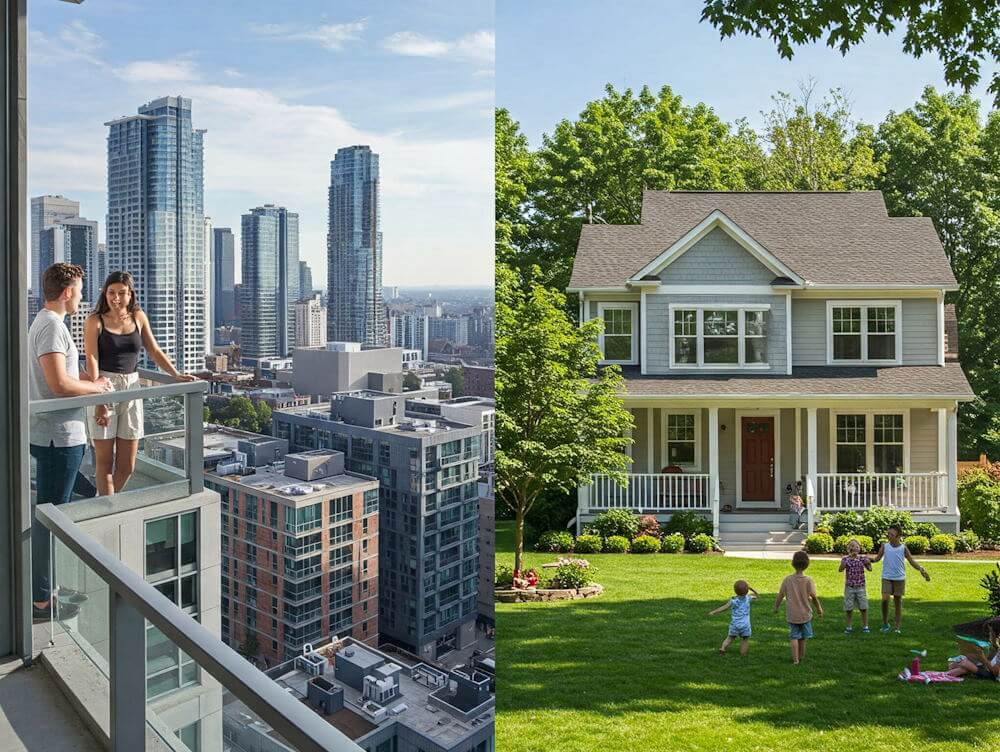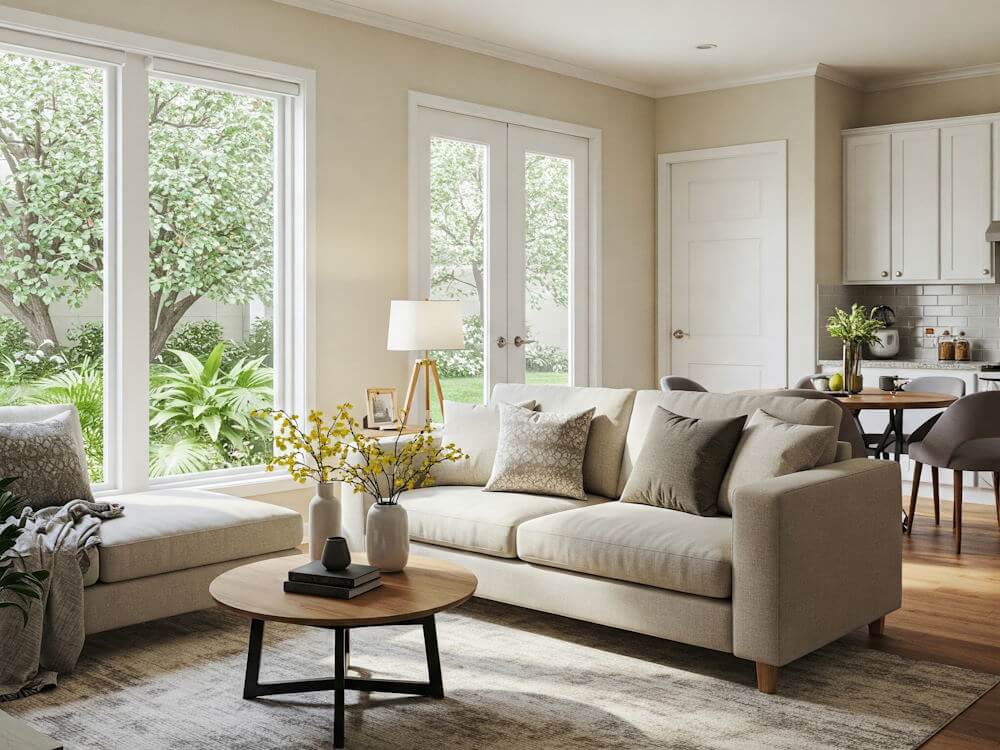Deciding between buying a home and renting one is a significant choice that requires careful consideration. Each option comes with its own set of benefits, challenges, and motivations that cater to varying lifestyles and financial situations. The choice to buy a home is often driven by factors such as a desire for stability, the accumulation of equity, and the potential for personalization. Conversely, renting may appeal to individuals seeking flexibility, lower upfront costs, and a minimal commitment in an unpredictable housing market.
Understanding current housing market trends is crucial for making an informed decision. In recent years, the dynamics of home buying have shifted considerably. Trends have shown rising home prices in many areas, often making the prospect of purchasing a home feel daunting. On the other hand, the rental market has similarly been affected by changes in demand and supply, impacting rental prices and availability. Such fluctuations necessitate that potential buyers and renters conduct thorough research to ascertain their best course of action.
Making informed decisions about one’s living arrangements can significantly influence long-term financial outcomes. This comprehensive guide aims to delineate the benefits and drawbacks of both home buying and renting. It will provide readers with insights into various factors to consider, including financial implications, personal circumstances, and market conditions. By the end of this post, readers will be better equipped to weigh their options and draw conclusions based on their unique needs and aspirations. Ultimately, whether one opts to buy or rent, understanding the intricacies of each decision is paramount for achieving a suitable living situation.
Financial Advantages of Buying a Home
Purchasing a home presents several long-term financial benefits, making it an attractive option for many individuals and families. One of the most significant advantages of homeownership is the ability to build equity. As mortgage payments are made, homeowners gradually increase their ownership stake in the property. Unlike renting, where monthly payments contribute to the landlord’s equity, homeownership allows individuals to invest in an asset that can appreciate over time. This growing equity can serve as a critical financial resource for homeowners, offering them options for future investments, such as a second property or retirement funds.
In addition to equity building, homeowners often experience appreciation in property value, further enhancing their financial position. Historically, real estate has shown a tendency to appreciate over the long term, albeit with some fluctuations in the short term. This appreciation can significantly increase a homeowner’s net worth, particularly in areas where demand for housing is strong. Moreover, as property values increase, so does the potential for profit if the homeowner chooses to sell the property in the future.
Another financial benefit of buying a home includes tax advantages that can lead to substantial savings. Homeowners are frequently eligible for deductions on mortgage interest and property taxes, which can offset their overall tax burden. These tax incentives help to reduce the effective cost of homeownership compared to renting. Additionally, certain programs may offer benefits for first-time homebuyers, further contributing to the affordability of purchasing a home.
When comparing the long-term financial implications of homeownership versus renting, it is evident that buying a home can foster increased financial stability over time. By building equity, enjoying property appreciation, and taking advantage of tax benefits, homeowners position themselves for more prosperous financial futures. Unlike the often transient nature of rental investments, homeownership establishes a foundation for wealth accumulation and long-term security.
Financial Disadvantages of Renting
Renting a home presents various financial disadvantages that can impact long-term wealth accumulation compared to purchasing a property. One of the most significant drawbacks is the absence of equity building; renters essentially pay their landlords’ mortgage while failing to build any ownership stake in the property. This detracts from potential future wealth, as homeowners benefit from property appreciation over time, leading to increased net worth. In contrast, renters lose out on these financial advantages and remain essentially transient in nature.
Moreover, rental rates are often subject to annual increases that can put a strain on personal budgets. According to recent statistics, rental costs have surged by more than 20% in urban areas over the past five years, significantly outpacing wage growth. This ever-rising expense can lead to financial instability, particularly for those on fixed incomes or within lower-income brackets. Unlike fixed-rate mortgages, where monthly payments remain constant, renters may find it increasingly difficult to keep pace with housing costs, potentially leading to a precarious living situation.
Additionally, renting can limit financial flexibility. Renters cannot leverage the property for loans or credit, nor can they create value through renovations. This dynamic often forces renters to continue making payments without any return on investment. When comparing costs over an extended period, studies indicate that renters may pay thousands more than they would for a mortgage, especially when considering the compounded effects of escalating rents. Incidentally, after 30 years of renting, an individual could expend upwards of $1 million without acquiring a tangible asset, whereas homebuyers build one.
Flexibility and Stability Considerations
When weighing the benefits of buying a home versus renting, one of the most significant factors to consider is the balance between flexibility and stability. Renting tends to offer a higher degree of mobility, which is particularly appealing to individuals in transitional phases of their lives. For instance, young professionals might find themselves relocating frequently due to job opportunities or educational pursuits. In such situations, renting provides the advantage of minimal commitment, with lease agreements often spanning one year or even less. This flexibility allows tenants to move without the complications that come with selling a property, facilitating an adaptive lifestyle that can evolve with changing circumstances.
On the other hand, purchasing a home typically entails a longer-term commitment that can enhance stability and predictability in one’s living arrangements. Homeownership often fosters a sense of belonging and community, as residents establish roots in a neighborhood. Furthermore, owning a home often leads to consistent monthly payments, unlike rent, which can fluctuate with market conditions. This predictability can greatly assist in financial planning and budgeting, providing homeowners the comfort of knowing their housing costs will not increase unexpectedly.
Additionally, personal and professional situations bear immense influence on the decision to rent or buy. Families looking for a stable environment for their children’s education may prefer the predictability that comes with owning a home. Conversely, those who anticipate significant life changes, such as career shifts or family dynamics, may find it prudent to opt for the flexibility that renting offers. Ultimately, the right choice will vary significantly from person to person, depending on individual needs, financial goals, and lifestyle preferences.
Maintenance and Responsibility Factors
When considering the choice between buying a home and renting, it is crucial to evaluate the differing responsibilities associated with each option. Homeownership requires a greater level of personal involvement in the maintenance and upkeep of the property. Homeowners are typically responsible for not only routine maintenance tasks, such as lawn care, snow removal, and general repairs, but also for the financial implications that accompany these responsibilities. Unexpected costs, such as plumbing issues or roof repairs, can arise, necessitating adequate budgeting to accommodate these potential expenses.
Moreover, homeowners must invest time and effort into maintaining their properties. This involves not only simple repairs but also ensuring the overall condition of the home is upheld to retain property value and enhance living quality. This aspect of ownership can be rewarding; however, it also may lead to unexpected stress factors, particularly for those who possess limited DIY skills or experience.
On the other hand, renters generally enjoy a lower maintenance burden. In rented properties, the landlord or property management company often assumes responsibility for necessary repairs and upkeep. This alleviates immediate financial pressures as renters are typically not liable for unexpected maintenance costs. As a result, renters can allocate their financial resources towards lifestyle choices, travel, or savings, potentially leading to a different lifestyle experience.
Nevertheless, the downside of renting includes limited control over the living environment since landlords dictate maintenance schedules and policies. For renters, this can mean dealing with delays or frustration when repairs are needed, influencing their overall satisfaction with the living situation. Ultimately, the choice between homeownership and renting involves contemplating personal priorities concerning maintenance responsibilities, financial implications, and desired lifestyle flexibility.
Impact on Lifestyle and Personalization
Homeownership significantly influences one’s lifestyle by providing opportunities for personalization that renting rarely offers. When individuals purchase a home, they gain the autonomy to design and modify their living space according to their preferences and needs. This range of possibilities allows homeowners to create an environment that truly reflects their identity, values, and tastes. From choosing paint colors to renovating kitchens or landscapes, the decision-making power is in the hands of the owner. This level of control can contribute to a greater sense of satisfaction and well-being.
On the psychological front, the ability to personalize one’s living space leads to a stronger emotional connection to the home. Homeowners often experience increased levels of comfort and security in their own environments, as they have shaped these spaces to resonate with their personal aesthetics. The investment made in creating a bespoke home can offer a profound sense of pride and accomplishment, enhancing overall life satisfaction. In contrast, renters frequently face limitations due to the stipulations of rental agreements. Landlords may impose restrictions on alterations or decorations, which can lead to a feeling of transience and lack of ownership.
Furthermore, the stability afforded by homeownership can positively impact lifestyle choices. Homeowners are more likely to settle into communities, fostering connections with neighbors and becoming active participants in local activities. This stability contrasts sharply with the fluidity often associated with renting, where people may move frequently. The roots that homeowners are able to establish contribute to a sense of belonging and enhance social ties, which are crucial components of a fulfilling lifestyle.
In conclusion, the choice between buying a home and renting goes beyond financial considerations. Homeownership provides enhanced opportunities for personal expression and can greatly benefit one’s lifestyle and emotional wellbeing through substantial autonomy and the ability to build lasting connections within a community.
Market Conditions and Timing
Understanding the real estate market’s current conditions is crucial when deciding whether to buy a home or rent. Various external economic factors, including interest rates, employment trends, and housing inventory, can significantly influence your decision-making process. Timing plays a critical role, as market fluctuations can either enhance or diminish the appeal of owning versus renting.
Interest rates are a primary concern for prospective homebuyers. When rates are low, borrowing becomes less expensive, making home purchases more attractive. Conversely, high-interest rates can lead to increased monthly mortgage payments, which may make renting a more viable option. Keeping an eye on the Federal Reserve’s decisions and national economic indicators can provide insight into future interest rate trends, aiding potential buyers in making informed choices.
Employment trends also play a vital role in determining the housing market’s stability. A strong job market usually leads to increased consumer confidence, encouraging home purchases. Alternatively, high unemployment rates might lead individuals to favor renting to maintain flexibility. The availability of employment opportunities in your area can significantly influence your decision on whether it is an opportune time to invest in a home or continue renting.
Lastly, housing inventory is an essential factor to consider. A tight housing market with limited inventory may prompt potential buyers to act quickly to secure a home. Conversely, a surplus of homes can lead to more favorable conditions for buyers, such as reduced prices or increased negotiation power. Tracking local market trends can guide you on whether purchasing a home or renting aligns better with current real estate dynamics.
To assess whether it is a suitable time to buy or rent, research local market conditions, consult financial advisors, and leverage real estate platforms to monitor fluctuations. Being well-informed will allow you to make the choice that best suits your individual circumstances.
Long-term vs. Short-term Analysis
When considering the decision between buying a home and renting, it is critical to evaluate both short-term and long-term implications in relation to various life stages. Each option presents distinct advantages and drawbacks depending on individual or family circumstances, financial situations, and lifestyle preferences.
For young professionals, renting can often be a more flexible choice. This demographic typically values mobility due to career changes or opportunities that may arise in different cities. Renting allows them to maintain a lifestyle that accommodates their job market’s demands without the obligations that come with home ownership. Moreover, the initial costs of renting—such as deposits and first month’s rent—are generally lower than the extensive upfront costs of purchasing a home, which often includes a down payment, closing costs, and other related expenses. In a rapidly changing job market, this flexibility is a major consideration.
On the other hand, families often lean towards buying a home as their long-term living situation. Home ownership builds equity over time, allowing families to invest in their future. The stability of a permanent residence can provide children with a consistent schooling experience and a strong community network. Furthermore, the predictability of fixed-rate mortgage payments can be more financially advantageous in the long run compared to renting, where landlords might increase monthly costs at renewal time.
Retirees may find themselves in a unique position where they could benefit from both options. For some, downsizing from a larger family home to a smaller property can free up equity and reduce maintenance responsibilities. For others, renting offers a simpler lifestyle, avoiding the rigors of home maintenance and providing the flexibility to move to more suitable leisure environments. Each scenario underscores the importance of assessing future needs and preferences against current circumstances.
Conclusion: Making the Right Choice for You
Deciding between buying a home and renting is a significant choice that varies greatly based on individual circumstances. Throughout this guide, we have explored various aspects of both options, including financial implications, equity building, flexibility, maintenance responsibilities, and personal lifestyle goals. Each of these factors plays a crucial role in determining the best path for your housing needs.
When considering your financial status, it is essential to evaluate your current savings, income stability, and long-term financial goals. Buying a home often requires substantial upfront costs and ongoing expenses, while renting typically involves lower initial financial commitments. It’s important to assess if you are ready for the responsibilities of homeownership, such as property maintenance and potential changes in the housing market, which can affect your investment over time.
Your life goals should also influence this decision. If you plan to settle down in a particular area and have the financial means, purchasing a home can provide stability and create long-term equity. Conversely, if your work or personal life requires flexibility—such as moving for job opportunities or changing family situations—renting may be the more pragmatic choice. Furthermore, current market conditions can influence this decision significantly. A favorable real estate market might encourage home buying, while a challenging market could make renting more appealing due to potential risks associated with property investment.
Ultimately, the best choice depends on a careful assessment of your financial situation, lifestyle preferences, and the housing market dynamics. By weighing these considerations thoughtfully, you can make an informed decision that aligns with your goals and provides the most benefit to your overall well-being.




